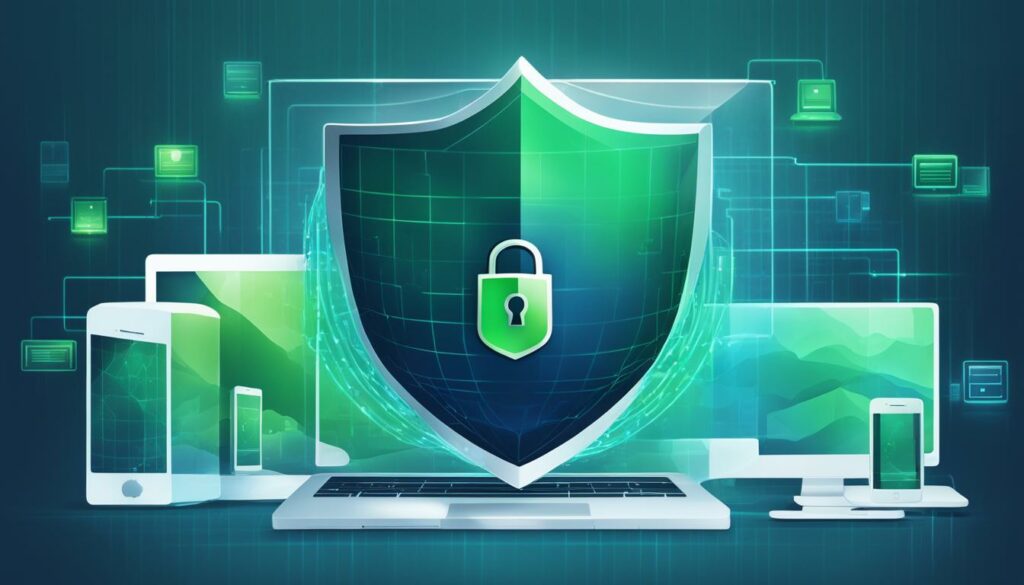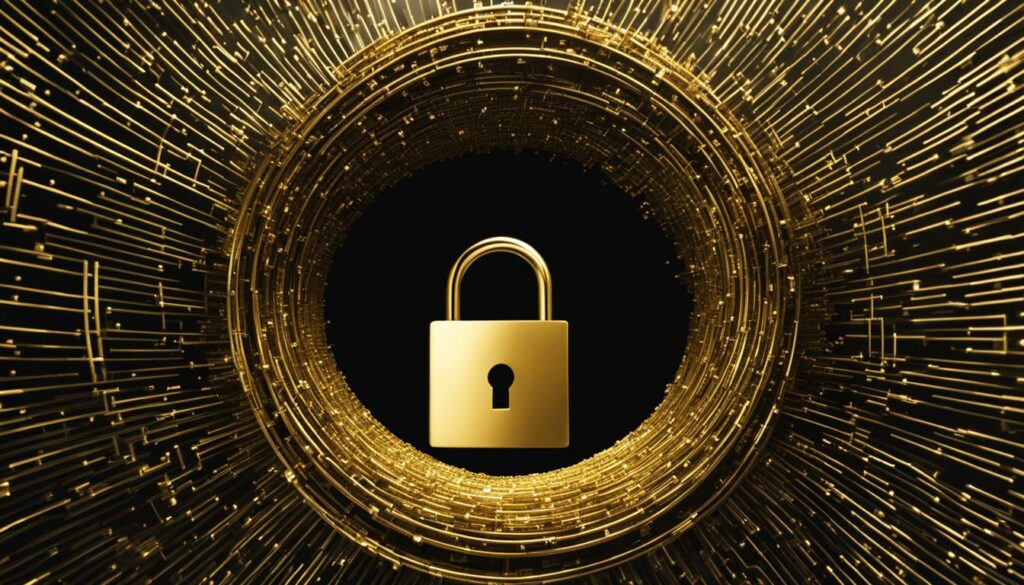A VPN, or Virtual Private Network, is a secure network connection that allows users to browse the internet privately and securely. It works by establishing a tunnel between the user’s device and a remote server, encrypting all internet traffic in real-time. This encryption ensures that third parties cannot track the user’s online activities or steal their data.
Key Takeaways:
- A VPN creates a secure network connection for private and secure browsing on the internet.
- It establishes a tunnel between the user’s device and a remote server, encrypting all internet traffic.
- VPN encryption prevents third parties from tracking user activities or stealing data.
- Using a VPN enhances online privacy and protects sensitive information from hackers or cyber criminals.
- VPNs provide the ability to bypass geo-restrictions and access restricted content.
Benefits of Using a VPN Connection
A VPN connection offers numerous benefits, primarily focused on security and privacy. By encrypting your internet traffic, VPNs provide a secure and private browsing experience, protecting your data from potential threats.
One of the key advantages of using a VPN is enhanced security. The encryption applied by VPNs ensures that your data remains protected from hackers and cybercriminals who may attempt to intercept it. This is particularly important when using public Wi-Fi networks, which are notorious for their vulnerabilities.
Another significant benefit of VPNs is anonymity and privacy online. By routing your connection through a remote server and masking your IP address, VPNs allow you to browse the web without being tracked by third parties, such as advertisers or your internet service provider.
In addition to security and privacy, VPNs also enable access to regional content that may be restricted in certain countries. By connecting to a server in a different location, you can bypass geographical restrictions and enjoy unrestricted access to websites and streaming services.
Furthermore, VPNs are commonly used by remote workers to ensure secure data transfer when accessing their company’s network. This allows employees to work remotely with confidence, knowing that their communications and sensitive information are protected.
Benefits of Using a VPN Connection:
- Enhanced security by encrypting internet traffic
- Anonymity and privacy online, preventing tracking
- Access to regional content that may be restricted
- Secure data transfer for remote workers
How Does a VPN Work?
A Virtual Private Network (VPN) functions by establishing a secure connection between a user’s device and a remote server. This secure tunneling process encrypts all data passing through it, ensuring privacy and preventing unauthorized access. Here’s a breakdown of the key components involved in how a VPN works:
VPN Protocol:
A VPN protocol refers to the set of rules and procedures that govern the secure transmission of data over a network. Common VPN protocols include OpenVPN, IPSec, L2TP, and PPTP. These protocols ensure that data is encrypted and transmitted securely between the user’s device and the VPN server.
VPN Server:
A VPN server acts as the intermediary between the user’s device and the internet. It receives data from the user’s device, encrypts it, and forwards it to the intended destination on the internet. The VPN server also receives data from the internet, decrypts it, and sends it back to the user’s device. By routing internet traffic through the VPN server, the user’s IP address is masked, providing anonymity and enhancing security.
VPN Tunneling:
VPN tunneling is the process of encapsulating data within an additional layer of security. It ensures that data transmitted between the user’s device and the VPN server remains encrypted and protected against interception or tampering. VPN tunneling uses various techniques, such as encapsulating or encrypting data packets, to establish a secure connection.
| VPN Protocol | Security Level | Speed |
|---|---|---|
| OpenVPN | High | Medium |
| IPSec | High | Medium |
| L2TP | Medium | Medium |
| PPTP | Low | High |
The table above provides a comparison of different VPN protocols in terms of security level and speed. OpenVPN and IPSec offer higher security but may have slightly lower speeds, while L2TP and PPTP offer medium security with varying speeds. The choice of VPN protocol depends on individual needs and preferences.
By utilizing VPN protocols, servers, and tunneling techniques, VPNs ensure that internet traffic is encrypted, user identities are protected, and online activities remain private and secure.
Why Should You Use a VPN Connection?
Using a VPN connection offers numerous benefits and is essential for ensuring your online privacy and security. Here are some compelling reasons why you should consider using a VPN:
Protects Your Online Privacy
A VPN connection hides your online activities from your internet service provider (ISP) and other third parties, preventing them from tracking your browsing history, collecting your personal data, or monitoring your online behavior. This is particularly important in an age where online privacy concerns are growing.
Safeguards Your Data on Public Wi-Fi Networks
When connecting to public Wi-Fi networks, such as those found in coffee shops or airports, your data is vulnerable to interception by hackers. However, by using a VPN connection, you can encrypt your internet traffic, ensuring that no one can eavesdrop on your online communications or steal your sensitive information.
Bypasses Geographic Restrictions
If you want to access content that is restricted in your region, a VPN connection can help you bypass these restrictions. By connecting to a VPN server in a different location, you can appear as if you are accessing the internet from that location, giving you access to regionally blocked websites, streaming services, or online gaming platforms.
Easy Setup with User-Friendly Clients
Setting up a VPN connection is relatively easy, and many VPN providers offer user-friendly clients for desktop and mobile devices. These clients make it simple to connect to a VPN server and enable the VPN features, ensuring that you can enjoy the benefits of a VPN without technical complications.

| VPN Setup | VPN Client | |
|---|---|---|
| Definition | The process of configuring and establishing a connection to a VPN server. | Software or application provided by a VPN provider that allows users to connect to the VPN server and manage VPN settings. |
| Importance | Crucial for ensuring a secure and private internet connection. | Enables easy connection to the VPN server and customization of VPN settings. |
| Setup Process | Typically involves downloading and installing VPN software, entering login credentials, and selecting a VPN server. | Requires downloading and installing the VPN client, followed by entering login credentials and choosing server locations. |
| User-Friendly | May require some technical knowledge but can be easily managed with step-by-step instructions. | Designed to be intuitive and user-friendly, allowing even non-technical users to connect to the VPN server effortlessly. |
The History of VPNs
The concept of a VPN originated in the 1960s with the development of ARPANET, a precursor to the modern internet. As the need for secure communication grew, various encryption and tunneling technologies were developed to protect sensitive information transmitted over networks.
In the following decades, VPNs evolved and became more widely used. Initially, they were primarily adopted by large corporations to facilitate secure remote access to their internal networks. As internet privacy concerns grew, VPN usage expanded to include individuals seeking to protect their online activities.
Today, VPNs have become an essential tool for internet users worldwide. They provide a secure and encrypted connection that allows users to browse the internet privately and securely. With the increasing prevalence of cyber threats and online privacy concerns, using a VPN has become crucial in maintaining online security and privacy.
Table: Evolution of VPNs
| Decade | Development |
|---|---|
| 1960s | Development of ARPANET |
| 1970s | Introduction of early encryption and tunneling technologies |
| 1980s | Corporations start using VPNs for secure remote access |
| 1990s | Advancements in encryption protocols and tunneling techniques |
| 2000s | Increased adoption of VPNs by individual users |
| Present | VPN usage becomes widespread for online privacy and security |
How VPNs Protect Your Online Privacy
When it comes to online privacy, VPNs are a highly effective tool. With their advanced encryption capabilities, VPNs ensure that your internet traffic is secure and inaccessible to unauthorized parties. By encrypting your data, VPNs make it virtually impossible for anyone to intercept or decipher your online activities. This is especially important when using public Wi-Fi networks, where hackers can easily gain access to your sensitive information.
Additionally, VPNs provide a layer of anonymity by masking your IP address. Instead of revealing your actual location, VPNs replace your IP address with that of the VPN server you’re connected to. This makes it difficult for websites, advertisers, and potential cyber attackers to track your online movements and identify your true location. Whether you’re browsing the web, streaming content, or accessing online banking services, VPNs ensure that your online privacy is protected.
“VPN encryption safeguards your data from potential threats and keeps your online activities private.”
VPN Encryption: Safeguarding Your Data
VPN encryption plays a crucial role in protecting your online privacy. When you connect to a VPN server, all your internet traffic gets encrypted using strong encryption protocols like OpenVPN or IPSec. These protocols use complex algorithms to encode your data, making it unreadable to anyone without the decryption key. This ensures that even if your internet connection is intercepted, your data remains secure and confidential.
By utilizing VPN encryption, you can browse the internet with peace of mind, knowing that your sensitive information is shielded from prying eyes. Whether you’re transmitting personal data, conducting online transactions, or simply communicating with others, VPN encryption safeguards your data from potential threats and keeps your online activities private.

| Benefits of VPN Encryption | Why It Matters |
|---|---|
| Data Security | Prevents unauthorized access to your sensitive information. |
| Online Anonymity | Masks your IP address, making it difficult to track your online activities. |
| Protection on Public Wi-Fi | Safeguards your data from potential hackers on insecure networks. |
| Bypassing Geo-Restrictions | Allows access to regionally restricted content or services. |
With the increasing threats to online privacy, using a VPN with strong encryption has become essential. By securing your internet connection and protecting your data, VPNs empower you to navigate the online world with confidence and privacy.
Different Types of VPNs
A Virtual Private Network (VPN) is a versatile tool that offers different types of connections to suit various needs. Understanding the different types of VPNs can help you choose the one that best fits your requirements. Let’s explore the three main types of VPNs:
1. SSL VPN
An SSL VPN, also known as a Secure Sockets Layer VPN, is commonly used for remote access. It allows employees to securely connect to their company’s network from external locations. SSL VPNs use encryption and authentication protocols to ensure a secure connection between the user and the network. This type of VPN is especially useful for remote workers who need access to their company’s resources while maintaining high levels of security.
2. Site-to-Site VPN
A site-to-site VPN is used to connect multiple networks together. This type of VPN allows different company branches or locations to communicate with each other securely over the internet. Site-to-site VPNs establish a secure connection between the routers of the different networks, enabling seamless and protected data transfer between them. It is commonly used by large organizations with multiple offices spread across different geographical locations.
3. Client-to-Server VPN
A client-to-server VPN, also known as a remote access VPN, is designed for individuals who want to access a specific server or network remotely. This type of VPN allows users to securely connect to a specific server or network over the internet. It is commonly used by individual users who want to access their home network or work network while traveling or working remotely.
Each type of VPN has its own implementation and unique features. Whether you need remote access to your company’s resources, want to connect multiple networks together, or require secure access to a specific server or network, there is a VPN type that can meet your needs.
| VPN Type | Main Use Case | Features |
|---|---|---|
| SSL VPN | Remote access | Encryption, authentication protocols |
| Site-to-Site VPN | Multi-network connectivity | Secure communication between networks |
| Client-to-Server VPN | Individual remote access | Secure connection to a specific server or network |
How VPNs Keep You Safe Online
When it comes to online safety and security, VPNs play a crucial role. By encrypting your internet connection, VPNs provide a strong layer of protection that keeps your personal information safe from prying eyes. The encryption process ensures that your data remains confidential and cannot be intercepted by unauthorized parties.
But encryption is just one part of the equation. VPNs also create a secure tunnel between your device and the VPN server, making it nearly impossible for anyone to tamper with or intercept your data. This added layer of security is especially important when using public Wi-Fi networks, where hackers often lurk to steal sensitive information.
Another feature that enhances online safety is the kill switch. A kill switch is a built-in mechanism that terminates your internet connection if the VPN connection is suddenly disrupted. This prevents any data leaks and ensures that your online activities remain protected even if the VPN connection drops momentarily.
In summary, VPNs provide comprehensive online safety by encrypting your internet connection, creating a secure tunnel, and offering a kill switch feature. With a reputable VPN provider, you can have peace of mind knowing that your online activities are kept safe and secure.
How Encryption Works in a VPN
Encryption plays a crucial role in ensuring the security and privacy of your data when using a VPN connection. By understanding how encryption works in a VPN, you can better appreciate the level of protection it provides.
In a VPN, encryption involves encoding your internet data so that it becomes unreadable without the proper decryption key. This process helps safeguard your sensitive information from unauthorized access and interception. VPNs use various encryption protocols, such as OpenVPN or IPSec, to implement strong encryption algorithms that ensure the confidentiality and integrity of your data.
VPN encryption protects your online activities and makes it nearly impossible for anyone to eavesdrop on your communications or steal your information. It creates a secure tunnel between your device and the VPN server, ensuring that all your internet traffic remains encrypted and secure. The encryption key used in the process is unique to each VPN session, providing an additional layer of protection.
The strength of the encryption in a VPN is measured by the length of the encryption key used. Common encryption key lengths include 128-bit, 256-bit, and even higher. The longer the key length, the more secure the encryption. A higher bit key length means it would take a longer time for an attacker to decrypt the data, making it significantly more challenging to compromise your information.
| Encryption Protocol | Key Length | Security Level |
|---|---|---|
| OpenVPN | 256-bit | High |
| IPSec | 128-bit | Medium |
| WireGuard | 256-bit | High |
As shown in the table above, different protocols offer varying levels of security based on their encryption key lengths. It’s important to choose a VPN provider that utilizes strong encryption protocols and key lengths to ensure the highest level of protection for your online activities.

Summary:
- Encryption in a VPN involves encoding your internet data to protect it from unauthorized access.
- VPN encryption protocols, such as OpenVPN or IPSec, utilize strong encryption algorithms.
- The strength of VPN encryption is determined by the length of the encryption key.
- Choosing a VPN provider that employs robust encryption protocols and longer key lengths ensures a higher level of security.
Conclusion
In conclusion, VPNs offer a crucial solution for ensuring online security and privacy. By encrypting internet connections and masking IP addresses, VPNs protect user data from prying eyes. With the ever-increasing prevalence of cyber threats and concerns about online privacy, using a VPN has become essential in today’s digital landscape.
Whether for personal or professional use, investing in a reliable VPN can provide peace of mind and a safer online experience. VPNs not only safeguard sensitive information from hackers and cybercriminals, but they also enable users to bypass geographic restrictions and access blocked content. Furthermore, VPNs are easy to set up, with user-friendly clients available for desktop and mobile devices.
In summary, understanding how VPN connections work and the benefits they offer is essential for anyone looking to enhance their online security and privacy. With the ability to encrypt internet traffic and provide anonymity online, VPNs are an indispensable tool for anyone seeking a secure browsing experience. Consider using a reputable VPN provider to ensure your data remains safe and protected while surfing the web.
FAQ
What is a VPN?
A VPN, or Virtual Private Network, is a secure network connection that allows users to browse the internet privately and securely. It encrypts all internet traffic between the user’s device and a remote server, ensuring that third parties cannot track the user’s online activities or steal their data.
What are the benefits of using a VPN connection?
VPNs enhance security by encrypting internet traffic, protect online privacy by allowing users to browse the web anonymously, provide access to restricted content in certain countries, and offer secure data transfer for remote workers accessing their company’s network.
How does a VPN work?
A VPN works by establishing a tunnel between the user’s device and a remote server run by a VPN provider. It encrypts all data that passes through it, replaces the user’s IP address with the VPN server’s, and uses various protocols and tunneling techniques for secure data transmission.
Why should you use a VPN connection?
Using a VPN connection is important because it protects your online privacy, safeguards your data when connecting to public Wi-Fi networks, allows you to bypass geographic restrictions, and provides added security measures such as kill switches to prevent data leaks.
What is the history of VPNs?
The concept of VPNs originated in the 1960s with the development of ARPANET. VPN usage initially started with corporations for secure remote access and later expanded to include individuals concerned about online privacy. Today, VPNs have become essential for internet users worldwide.
How do VPNs protect your online privacy?
VPNs protect your online privacy by encrypting your internet traffic and masking your IP address. This encryption ensures that your data cannot be intercepted or deciphered, and the IP address substitution makes it difficult for websites, advertisers, or potential attackers to track your activities or identify your location.
What are the different types of VPNs?
There are several types of VPNs, including SSL VPNs for remote access, site-to-site VPNs for connecting multiple networks, and client-to-server VPNs for individuals accessing a specific server or network remotely.
How do VPNs keep you safe online?
VPNs keep you safe online by encrypting your internet connection, creating a secure tunnel between your device and the VPN server, and protecting your data from interception or tampering. They often include features like kill switches to prevent data leaks in case of an interrupted VPN connection.
How does encryption work in a VPN?
Encryption in a VPN involves encoding your internet data so that it cannot be read without the proper decryption key. VPNs use various encryption protocols, such as OpenVPN or IPSec, which employ advanced encryption algorithms to ensure data confidentiality and security.






